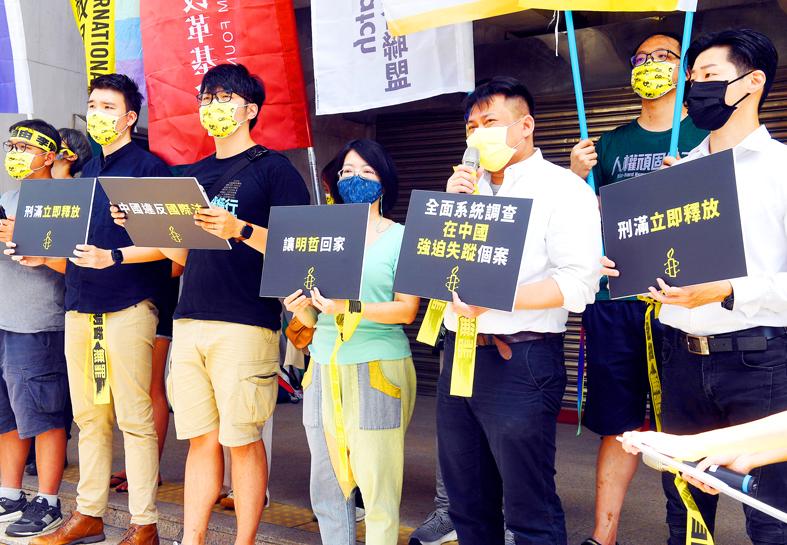Lawmakers and human rights campaigners yesterday called on Beijing to allow access to jailed Taiwanese activist Lee Ming-che (李明哲) amid fears over his health condition.
Lee has been jailed for 1,623 days at a prison in Hunan Province, while Chinese authorities have cut off Lee’s contact with the outside world since early last year and have not allowed his family to visit him, Amnesty International Taiwan secretary-general Chiu Ee-ling (邱伊翎) said at a rally outside the Legislative Yuan in Taipei.
The rally is a reminder to the public about the plight of Lee and other Taiwanese imprisoned in China because of unfair trials or detained without due process of law, she said.

Photo: CNA
Yesterday also marked the International Day of the Victims of Enforced Disappearances, Chiu said.
Detained after entering mainland China from Macau in March 2017, Lee was accused of working with dissidents and activist groups within China.
He was charged with “subverting state power” by promoting “Western-style democracy,” and in November 2017 was sentenced to five years in prison and deprived of political rights for two years.
“Lee will complete his prison term soon and is supposed to be released in April next year. However, we are concerned that he might continue to be held against his will. Up to today, the Chinese government still has not sent the official ruling statement to his family, and did not give any answer when asked about the release date,” Chiu said.
Lee’s family is worried that the Chinese government would apply the “deprivation of political rights” penalty to detain him for two more years, and then use some other pretext to continue holding him in China after that, she added.
Amnesty and other human rights groups said Lee’s trial was a political show, and that Beijing had decided early on to find him guilty of subversion and send him to jail.
The groups called for his immediate release, adding that they have asked the Mainland Affairs Council (MAC) for assistance in conferring with its Chinese counterpart on the matter.
MAC information shows that China is holding more than 2,000 Taiwanese in prison, most of whom are victims of unfair trials and jailed without due process of law, while some involve businesspeople embroiled in financial disputes or who had broken the law and were convicted, Taiwan Human Rights Association secretary-general Shih Yi-hsiang (施逸翔) said.
The Beijing government has in most cases stripped them of their personal liberty and freedom of expression, and denied them protection under international rights mechanism, such as the International Convention for the Protection of All Persons from Enforced Disappearance and the Universal Declaration of Human Rights, Shih said.
“Beijing has cut off all contact [with Lee] and denied visitations by Lee’s wife since early last year, which [Chinese officials] said are for health and safety considerations because of the COVID-19 pandemic,” Shih said.
“It has been close to two years that family members have no communication with Lee and have no idea what condition he is in, whether he has suffered maltreatment or abuse,” Shih added.
Democratic Progressive Party (DPP) Legislator Hung Sun-han (洪申翰) urged the MAC to be more proactive in providing assistance to Lee and other imprisoned Taiwanese.
Independent Legislator Freddy Lim (林昶佐) called on Beijing to release Lee after his five-year sentence ends next year.
China has a poor track record on human rights, sending people to prison without due process of law, and persisting in violating values that are cherished in democratic societies, he said.

POSITIVE DEVELOPMENT: Japan and the US are expected to hold in-depth discussions on Taiwan-related issues during the meeting next month, Japanese sources said The holding of a Japan-US leaders’ meeting ahead of US President Donald Trump’s visit to China is positive news for Taiwan, former Japan-Taiwan Exchange Association representative Hiroyasu Izumi said yesterday. After the Liberal Democratic Party’s landslide victory in Japan’s House of Representatives election, Japanese Prime Minister Sanae Takaichi is scheduled to visit the US next month, where she is to meet with Trump ahead of the US president’s planned visit to China from March 31 to April 2 for a meeting with Chinese President Xi Jinping (習近平). Japan and the US are expected to hold in-depth discussions on Taiwan-related issues during the

‘LIKE-MINDED PARTNER’: Tako van Popta said it would be inappropriate to delay signing the deal with Taiwan because of China, adding he would promote the issue Canadian senators have stressed Taiwan’s importance for international trade and expressed enthusiasm for ensuring the Taiwan-Canada trade cooperation framework agreement is implemented this year. Representative to Canada Harry Tseng (曾厚仁) in an interview with the Central News Agency (CNA) said he was increasingly uneasy about Ottawa’s delays in signing the agreement, especially as Ottawa has warmed toward Beijing. There are “no negotiations left. Not only [is it] initialed, we have three versions of the text ready: English, French and Mandarin,” Tseng said. “That tells you how close we are to the final signature.” Tseng said that he hoped Canadian Prime Minister Mark Carney

President William Lai (賴清德) yesterday bestowed one of Taiwan’s highest honors on Saint Vincent and the Grenadines (SVG) Ambassador Andrea Clare Bowman in recognition of her contributions to bilateral ties. “By conferring the Order of Brilliant Star with Grand Cordon on Ambassador Bowman today, I want to sincerely thank her, on behalf of the Taiwanese people, for her outstanding contribution to deepening diplomatic ties between Taiwan and SVG,” Lai said at a ceremony held at the Presidential Office in Taipei. He noted that Bowman became SVG’s first ambassador to Taiwan in 2019 and

A man walks past elementary school artworks at the Taipei Lantern Festival in Ximen District yesterday, the first day of the event. The festival is to run from 5pm to 10pm through March 15.